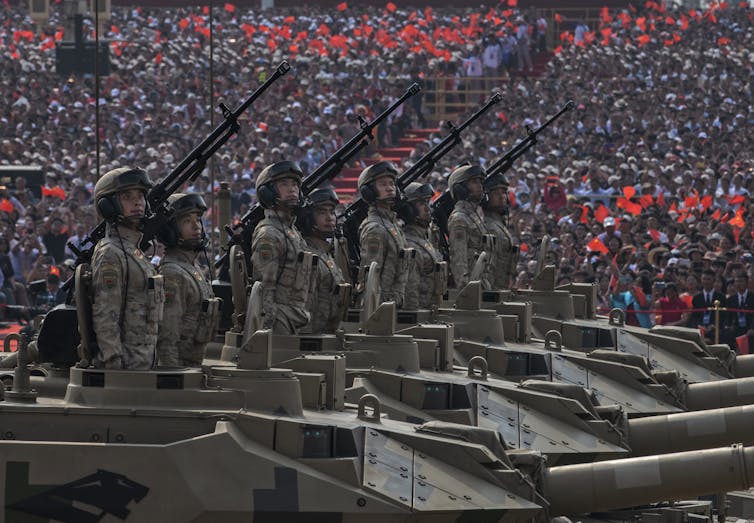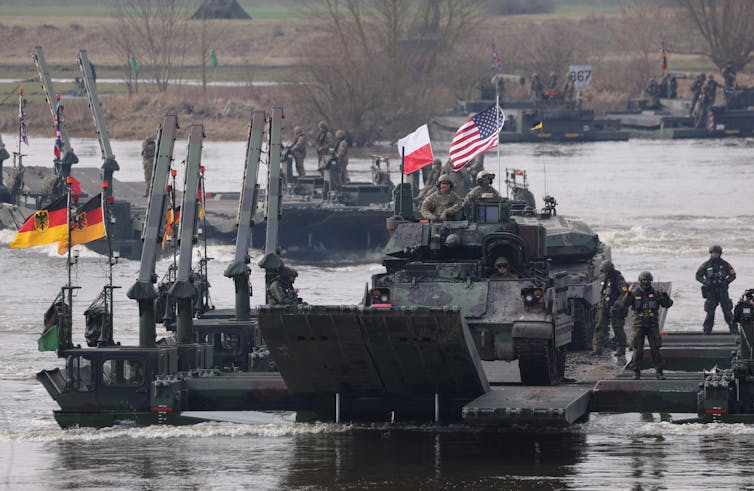
By Eric Rosenbach
President Joe Biden’s recent approval of a major shift in U.S. nuclear weapons strategy highlights the attention the country’s national security officials are paying to Chinese ambitions for influence in the world.
As changes emerge in the types of threats facing the U.S., the American military adjusts its strategic focus, budgets and planning. For instance, after 9/11, the U.S. military refocused away from its Cold War emphasis on preparing for combat against a powerful nation – the Soviet Union – and toward fighting small terrorist and insurgent groups instead.
Over the past decade, the Pentagon’s efforts have shifted back to preparing for what officials call “great power competition” among the U.S., Russia and China.
The most important strategic shift that’s evident in planning for great power competition is a focus on deterrence. In classic military strategy, deterrence focuses on making an adversary believe they can never achieve their goals by military force, because the response would be overwhelming and decisive. The National Defense Strategy released in October 2022 – the document that articulates the nation’s goals, objectives and resource allocation for the next two years – explicitly recognizes the potential risk of tensions and open conflict with Russia or China, and it calls for “integrated deterrence” to prevent it. That means combined efforts from the military, intelligence and diplomatic agencies across the U.S. government.
The National Military Strategy – the military’s section of the overarching National Defense Strategy – lays out how the U.S. armed forces will contribute to that effort. As a former assistant secretary of defense and Pentagon chief of staff, I see that the military is focusing on three main goals to achieve integrated deterrence and prevent a conflict with Russia or China.
New operational plans
For the military, integrated deterrence means the armed forces will depend both on where forces are located and what they can do once they’re in action to influence adversaries’ decisions about when, where, how – and whether – to use military force against the U.S. or its interests.
In the shift away from counterterrorism toward preparation for a great power conflict, the Defense Department has developed new ways to deal with the fact that Russia and China, unlike small terrorist groups, can fight in the air, on land and at sea anywhere around the world – and online and in space, too.
First among those methods is what the Pentagon calls “dynamic force employment,” in which U.S. military forces are deployed rapidly around the world, without predictable rotation schedules. This approach can reassure allies facing threats from Russia or China.
For example, the U.S. has, at times, deployed as many as 10,000 troops to Poland. The troops are not permanently stationed there, but a continuous presence of U.S. forces keeps Russia guessing about the size and capabilities of the force and demonstrates a commitment to support nervous NATO allies in Eastern Europe.
Second is a shift of personnel and capabilities to what is called “multi-domain operations,” in which units with different missions across air, land, sea, space and cyberspace plan and train together. That way, they can be prepared to work closely together in actual conflicts.
This level of collaboration allows the nation to respond to threats in a variety of ways. For instance, challenges to American naval power on the high seas do not have to be met directly with corresponding naval action, but instead could be answered with cyberattacks or from space.
This approach might make the Chinese People’s Liberation Army think twice about launching military operations against Taiwan. Not only would the Chinese potentially face a fierce direct conflict, but U.S. cyber and space operations could also disrupt or destroy Chinese military communications, hindering their attack.

Kevin Frayer/Getty Images
Investments in modernization
Recent research has shown that China’s investments in its military personnel and capabilities – particularly in air, naval and nuclear forces – have grown exponentially over the past two decades, to a level estimated at near parity with the United States. This has prompted the U.S. to modernize its own military’s corresponding capabilities. For the 2024 budget, the Department of Defense allocated a whopping US$234.9 billion for programs to support integrated deterrence, which likely represents a 10% increase over previous spending plans.
Some of this money will go to developing and acquiring F-35 fighter jets and building Columbia-class, nuclear-powered submarines. When the U.S. and its allies in the Pacific region, such as Japan, South Korea and Australia, deploy these planes and submarines, they will remind potential adversaries of American military power – which is itself a deterrent against foreign aggression.
Over the past 10 years, China’s rapid expansion of its nuclear weapon supply has alarmed senior policymakers in the U.S. Although then-President Barack Obama pushed countries to envision a world free of nuclear weapons, he approved the most expensive and significant upgrade ever to the U.S. nuclear arsenal. In 2022, the Biden administration renewed a financial commitment to “field a modern, resilient nuclear triad” consisting of intercontinental ballistic missiles, submarine-launched missiles and long-range nuclear bombers.
Advancing technology
In 2019, the Space Force was established as a separate branch of the armed forces and tasked with defending American space-based assets and upholding international law. Because of the importance of satellite communications to military operations and civilian life – including internet connectivity – the Space Force works closely with Cyber Command, the military organization charged with defending the nation against cyberattacks, to prevent malicious hackers from disrupting systems vital to the world, such as the Global Positioning System, widely known as GPS.
Recent intelligence indicates that China plans to conduct destructive cyberattacks against U.S. domestic critical infrastructure, including the electric grid, during any conflict. To counter those plans, Cyber Command continues to enhance its abilities to defend U.S. systems and companies against cyberattacks, as well as to conduct attacks against systems in other countries.
The Pentagon is also seeking to counterbalance China’s rapidly expanding military forces by using artificial intelligence software in a program called the Replicator Initiative. The effort seeks to build thousands of low-cost, AI-directed autonomous aircraft and boats that can be used in combat to “counter the (Chinese military)’s mass with mass of our own,” in the words of Deputy Secretary of Defense Kathleen Hicks.

Sean Gallup/Getty Images
Integration with allies and partners
The U.S. military has also sought to strengthen alliances with other countries, especially over the past four years of the Biden administration.
Russia’s 2022 invasion of Ukraine led NATO to expand its membership as well as the numbers and capabilities of troops available to the organization. The U.S. has reinforced its commitment to NATO, increasing troop deployments in Eastern Europe and support for European defense initiatives by committing nearly $3 billion in funding for additional fighter aircraft, air-defense batteries and munitions.
In Asia, around the Indian Ocean and across the Pacific Ocean, a vast region that the government often calls “the Indo-Pacific,” the U.S. has strengthened alliances with Japan, South Korea and the Philippines by conducting numerous military exercises and increasing military assistance. Efforts like the annual Marine Aviation Support exercise are aimed at countering Chinese military and political influence.
The U.S. has also sought to strengthen its alliances with the U.K. and Australia, with a commitment to sell up to five conventionally armed, nuclear-powered submarines to the Australian navy by 2030.
Collectively, the U.S. has combined all of these efforts into a coordinated approach seeking to avoid open conflict with China and Russia. But the work is not yet done: The global political and military landscape is ever-changing, and new security challenges are always emerging.
![]()
Eric Rosenbach is Senior Lecturer in Public Policy at Harvard Kennedy School. Grace Jones, a master’s student in public policy and research assistant at the Harvard Kennedy School of Government, contributed research to this article.




























A Concerned Observer says
Let’s not forget about North Korea. Yes, it is a small, backward country, but it is ruled by a maniacal, power hungry, narcissist despot. Kim Jong Un is maniacal, power hungry, narcissist despot armed with nuclear weapons and ballistic ICBMs to carry them to a large portion of the only world we have.
DaleL says
North Korea is the most militarized nation on Earth. However, a Newsweek assessment from January 23, 2024 says in part: “But in the event of a conventional war between the two states, “…the assumption is that the South Koreans would be able to hold their own,” even without the U.S. alliance, Yeo said. North Korea’s military, for all its volume, lacks the breadth of training experience South Korea has gained through military exercises with the likes of the U.S.,…”
In addition, North Korea’s equipment is less capable and old Soviet types and designs.
The U.S. nuclear forces are the deterrent to prevent the North from using its small nuclear arsenal.